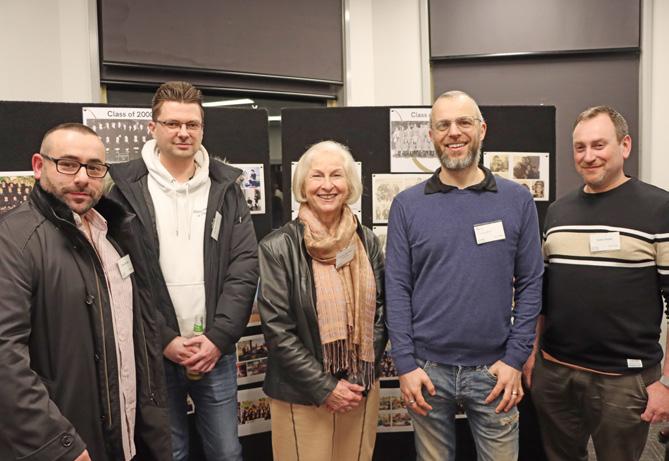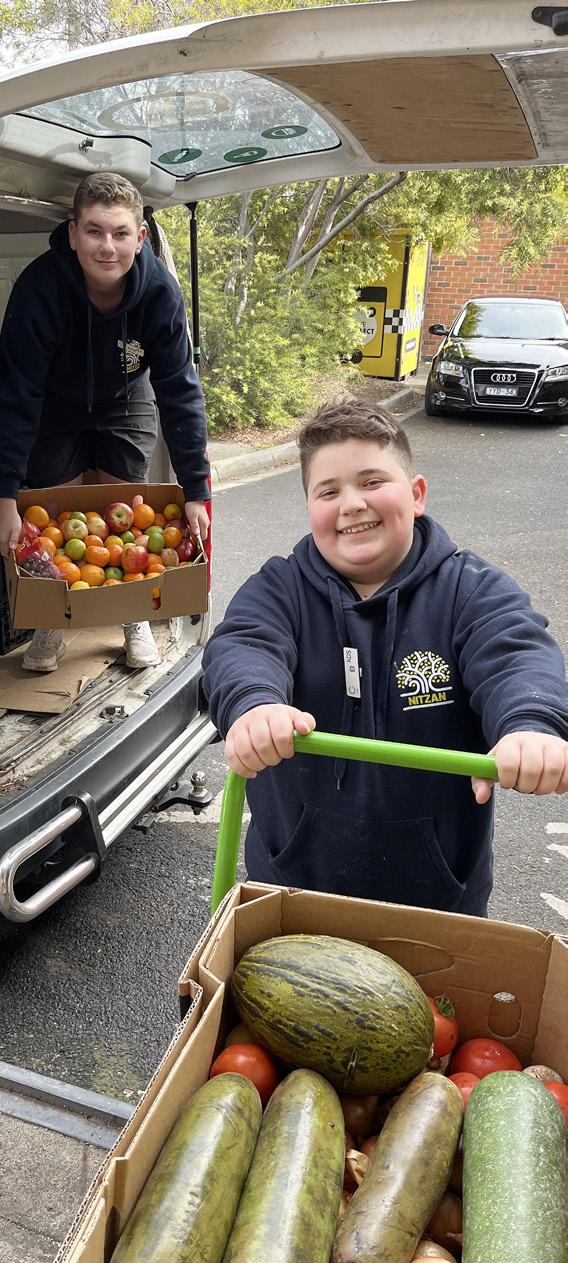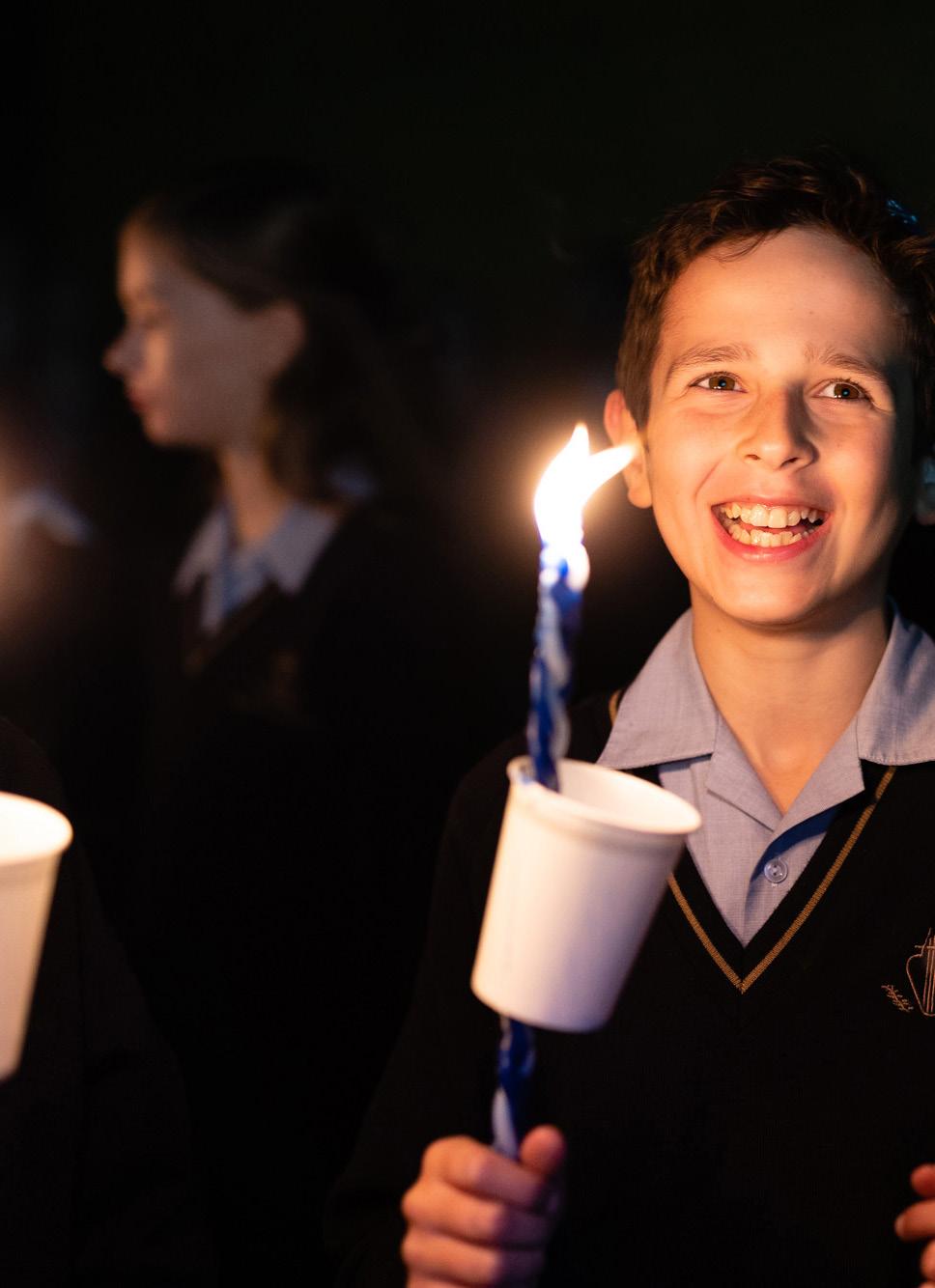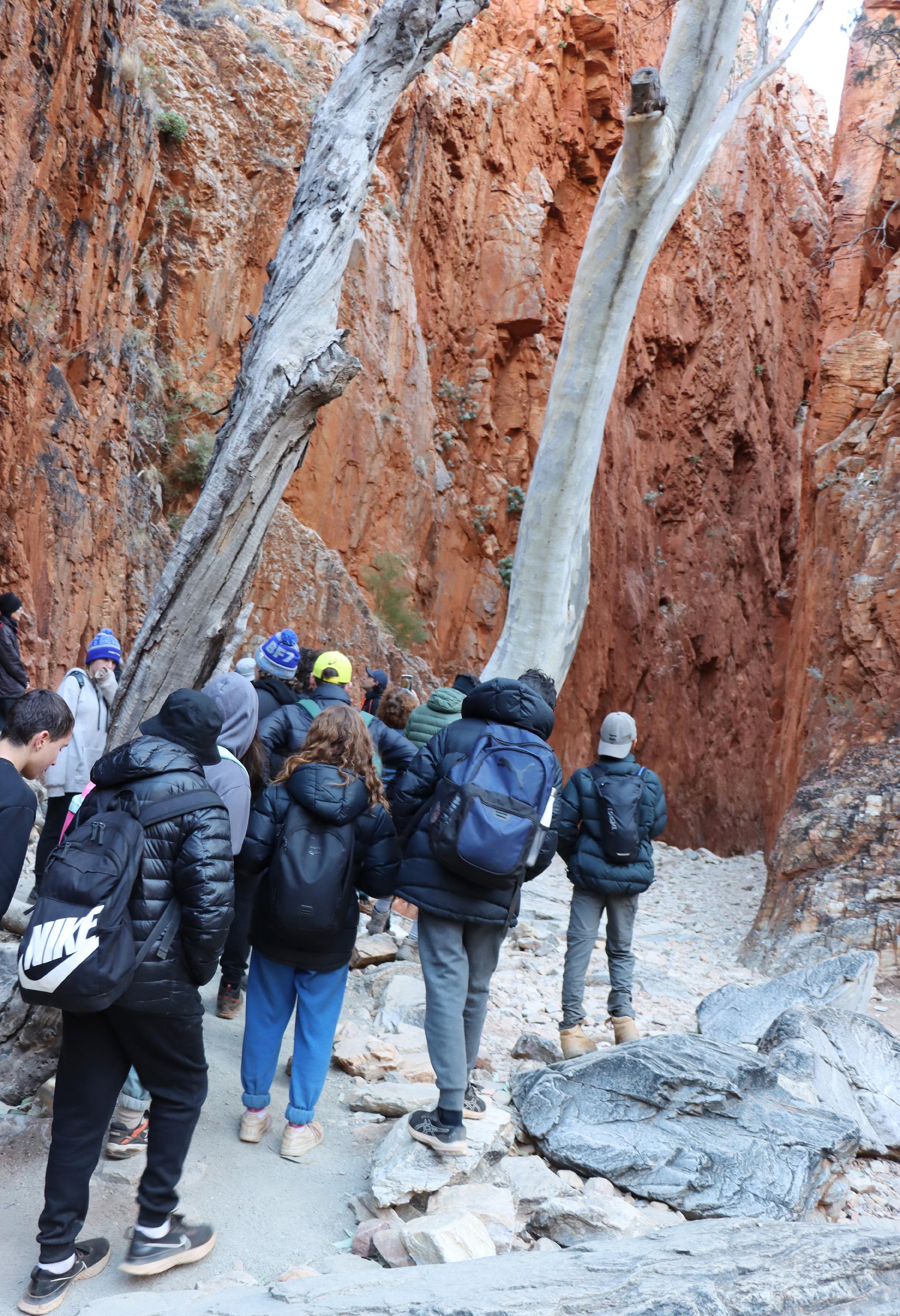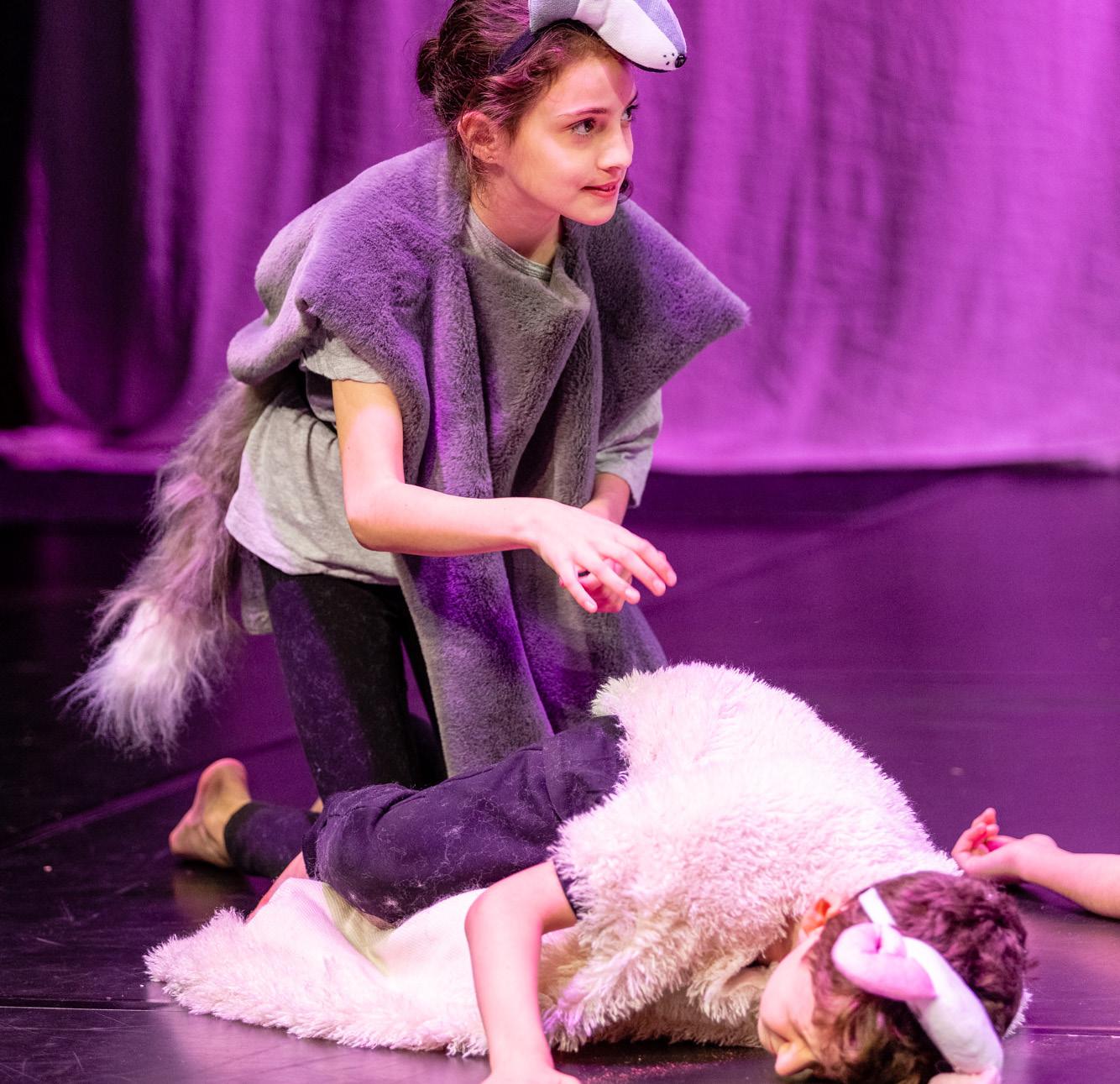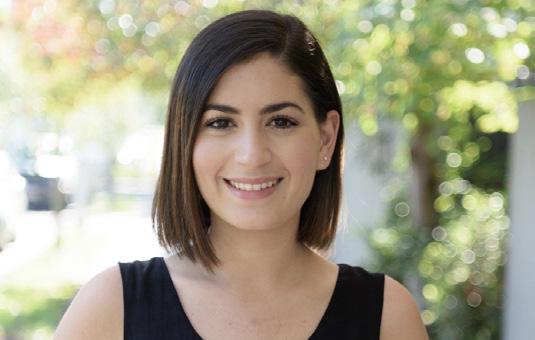
12 minute read
Feature: Outdoor Education
LEARNING IN THE WILDERNESS – OUR CAMPS PROGRAMS
Sleeping under the stars, the sky stretching out endlessly as the cicadas serenade you and your classmates. These are the memories we hold on to – we can almost smell the camp site years later. Camps are where friendships are formed, our limits are tested, and where we learn new things about ourselves and the wider world. The King David School has a comprehensive camps program, beginning in Year 3. Our camps are structured so that each year scaffolds students for the next year’s camp program. Currently in Year 3, students go to Wombat Corner for a night. For many students, this is the first time they have stayed away from home or from their family members. Year 4 students return to Wombat Corner, this time for two nights (three days). Year 5 students currently camp near Bacchus Marsh for three nights, visiting Sovereign Hill to experience the Gold Rush era (part of the Year 5 curriculum), as well as learning about symbiosis in nature. The Year 6 camp is also linked to the curriculum, with students spending five days in Canberra learning about democracy, citizenship and the formation of our nation. Our Year 7 students spend five nights in Anglesea, bonding with each other, learning how to surf and stand up paddle board. Year 8 students experience Australia’s Red Centre for nine days, visiting Uluru and surrounds, learning about First Nations’ history and culture. Our Year 9 cohort are away for 12 days as they hike in Gariwerd (the Grampians). Later in the year, they engage deeply with Israel on a four-night camp at Wombat Corner. Our Year 10 students undertake a three-day camp focused on learning leadership skills, then they embark on our month-long Yesh program in Israel. Year 11 students currently visit Tasmania for four days, exploring Australia’s oldest standing shul and learning about convict history. Later in the year, Year 11 students embark on a sailing camp, navigating yachts through the Gippsland lakes. Finally, our Year 12 students have a three-day Shabbaton, cementing their bond as a cohort and providing opportunities to think about their role as Jewish adults.

Our Camps Coordinator, Russell Newman, explains that each camp facilitates students bonding with each other, learning, and challenging themselves. “What we’re trying to do is to make each and every camp powerful, positive and purposeful.” Russell reiterates that King David’s values of inclusivity, egalitarianism and social justice are woven throughout each program. Camps are a chance for students to socialise with others they don’t usually spend time with, to make decisions together, and learn about our environment. Russell adds, “we want camps to actually make a positive difference for our students.” Many of the teachers interviewed, observed that camp offers them a chance to learn more about students and experience their full personalities. Junior School teacher Anna Fink says, “we see a completely different side to these students.” Camps are also “an amazing opportunity for us and for the students to see the skills that they have that we wouldn’t usually see in the classroom”, said Anna. Tzev Lev (Jewish Experiential Education) Coordinator Yoel Benn, says “There are a lot of students who find the daily routine of school difficult and they thrive on camp. It’s great to get to know students as their complex selves – different environments bring different things out of them.” Camp also gives students a chance to see teachers in a different light. Year 9 student Dylan Padowitz said, “We were also able to have a lot of fun with the KDS staff, who when in a casual environment are interestingly, quite a bit of fun!” Years 9 and 10 Coordinator Kathy Ross observes that camp shows students that teachers can be vulnerable too. Camp takes students out of their routines and their familiar zones. Kathy says that students can “curate their lives in such a way that they’re not challenged often, whereas camp gives them an opportunity to face things that are a bit challenging and uncomfortable and push through and see what they’re capable of.” Camps are structured so that students solve problems together, and push themselves physically and emotionally. Year 10 student Shelley Wajsbrem relays how on Year 7 camp, she learned that “I could do more than I thought I could.” On last year’s Year 3 camp, torrential rain threatened to dampen the activities, but the students still went tree surfing in the rain. Students got into harnesses, and supported each other to go. Anna Fink said, “In the classroom, it’s easy to say ‘I don’t know’ or ‘I’m not sure’, and then when you’re there in a harness and you’re terrified but all the kids have gone before you and it looks fun – it’s easy to push yourself.

Once students do one thing that’s scary, they want to do it again and again. They’re proud that they did it and they realise that they can do something that’s scary for them.” Kathy Ross reiterates that “Praise is one thing; writing feedback in a report is one thing; but students actually putting their pack together, setting up their tent, cooking in the rain – there’s no richer feedback in terms of their sense of self.” Thinking about camps overall, Russell Newman believes that the main skill camps teach is “how to put up and find the comfort in being uncomfortable sometimes.” Resilience is a skill that students will draw on for the rest of their lives. Russell gives the example of the Year 9 camp where students hike for an extended period of time. Students have nicknamed this camp, ‘the survival camp’. Russell says that many of the students are fearful before the camp, and yet the feedback afterwards “highlights that it’s not a survival camp, it’s actually where they’ve communicated and shared and understood each other far more than what they would have normally.” Russell points out that an important part of camps at King David is to teach students that they have the support that they need: from their peers and friends, and from staff. The Year 8 Central Australia camp for example, encourages students to “step into an uncomfortable environment and learn to find the support structures within peers up there”, said Russell. On Year 9 camp, “we try to get the students to understand that within a small group, you’ve got all the support structures that you need around you.” This is further reinforced on Year 11 camp when students need to support one another to sail a yacht - if they don’t, the yacht won’t move. Teaching students to draw on their peers for support teaches students how to give support. This asks students to embody King David’s values of egalitarianism and inclusivity. Of the Year 3 camp, Anna Fink said, it’s “amazing to see students who don’t usually play together encouraging each other, supporting each other - ‘C’mon mate there’s just 20 more steps to go until the next platform.’” Egalitarianism is further encouraged on the Year 4 camp, whereby the Year 4 students share a night at Wombat Corner with the Year 3 students, serving them dinner and helping the younger students adjust to life at their first camp. Russell Newman says, “The idea is that we’re trying to look after others who are less experienced than what we are there.” Year 7 camp creates opportunities for students to support each other as they learn how to surf, which scaffolds students in Year 8 to help their peers as they walk through Central Australia, further preparing students to hike together for an extended time in the Grampians in Year 9. Groups at camp are structured so that students interact with those outside of their immediate friendship group, learning more about each other and how to best offer support. Year 9 student Ava Boulton-Webb said, “the majority of the people in my camp group were people I wasn’t close with and or hadn’t really talked to. This changed at the end of the week and I was glad that I had made new connections.” Year 10 student Debbie Pastor said “I got to know people I’ve gone to school with for years a lot better and built connections with them that I wouldn’t normally be able to do.” These connections keep growing. Reflecting on the Year 12 camp, student Mia Wald said, “it taught me about myself and my relationships with others. I will never forget the unity and friendship bolstered from singing around the campfire.” For Mia, the camp “provided the rare opportunity to thank my classmates about their impact on my warm King David experience through written notes, allowing me to communicate with people I don’t speak to on a regular school day.” As well as expanding their relationships with peers and their support networks, camps offer students a chance to learn skills they will apply throughout their lives. Kathy Ross says camps “help develop the whole student”.

Besides skills such as how to care for the environment and cook using rudimentary materials, alongside resilience, Russell Newman lists independence, adaptability, communication, trust, and teamwork as attributes camps teach. This peaks in the Year 11 sailing camp whereby students have to work as a team within a confined space, mastering navigation, cooking and communication on the water. As students move through camps in the Senior School they are given more autonomy which allows them to practice decision-making alongside communication and teamwork. Yoel Benn points out that as opposed to the structured environment of the classroom, camps ask students to shape their experiences, taking responsibility for themselves and their classmates. Students plan activities, themed dinners, Shabbat services, cooking duties, and even wake up times as they get older. Yoel says that one of his highlights of camps is seeing students “step up and take responsibility for their own Jewish identities and their community.” A further life skill our students learn on camps is how to disconnect from their devices. Reflecting on last year’s Year 10 camp, which was two weeks in the Victorian wilderness, Kathy Ross commented that the change in students over the camp as they got used to focusing outwards rather than on their phones was palpable. Kathy said, “It was just the most amazing time with no tech. The two week process got the students to a point where they were coming up with ideas – they joined us in running the camp. We navigated tricky situations together. The kids grew up in front of my eyes, culminating in a beautiful Shabbat and a talent night.” Students comment that they were happy to have time away from their devices and that it was easier than they expected. Learning how to switch off is a skill that is crucial in our activity-filled lives. This is increasingly important tool to help manage anxiety. As well as helping students become less reliant on devices, camps at King David have built-in relaxation time, particularly to mark Shabbat.


Yoel Benn says that Shabbat is “one of the greatest gifts in the world. It’s everything we value as Jews about relationships, giving nature a break, stepping away from our routines - it’s the ultimate life model for wellbeing.” Experiencing Shabbat together is “a great part of year level development, having that change of pace.” This helps students move from focusing on doing to focusing on connecting with themselves and their peers. Our camp programs create memories but also create lifelong skills – learning how to explore, to push ourselves, to connect with others, and how to rest. Incredible, just like the country our students get to experience.
OUTDOOR EDUCATION
Russell Kaplan
Vice Principal Teaching and Learning
The term Outdoor Education literally means learning “in and about” the outdoors. Students are provided with a range of learning experiences in the outdoors that challenge and consolidate their skills, knowledge and understanding of how the world works and their part in it. I think it is explained perfectly in the following quote: ‘Outdoor education does not have specific content, it just involves doing activities in the outdoors!’ (Dr Alison Lugg, Latrobe University) So how important is Outdoor Education in the development of King David students? Risk taking is a fundamental part of human development and is closely linked with our decision making. The ability to make effective decisions in the face of risk or uncertainty is an essential skill for all King David students, especially when navigating through our ever changing world. So whether our students are rock climbing or abseiling in the Grampians, or sailing in Bancroft Bay (Metung) they are constantly being required to assess risks and make judgements that will not only impact themselves, but their class mates as well. Problem solving is an integral part of human development and more essential for our students than ever before. Outdoor Education creates the learning environment for students to have practical experience in everyday problem solving. Whether they are engaging their critical and creative thinking skills through high and low ropes courses at Wombat Corner, orienteering in Sovereign Hill or working out how to catch a wave on a surfboard in Anglesea, King David students are constantly engaging their thinking skills to be effective problem solvers. While outdoor experiences create opportunities for self-reflection, they also create opportunities for social learning. Being part of a team or group assists children in finding their voice. As they share ideas, brainstorm, look at alternative perspectives, students are learning the integral skill of collaboration. This is an essential skill that will hold them in good stead as the progress through life. As you can see, our camp programs provide the perfect, safe learning environment for students to assess risks, problem solve and collaborate with their peers. While classroom learning most certainly can identify and define essential skills, strategies and understanding, it is only embedded in our neural pathways once we have the opportunity to transfer the learning into action. “Life is always better in the great outdoors!”


